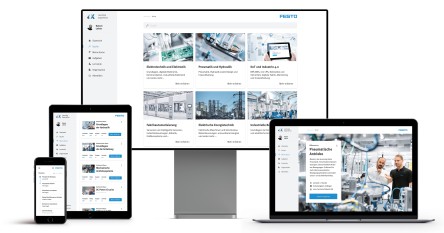The skills gap – the challenge of our time
New technologies are developing at a rapid pace. And so industrial practice and the skills that workers need to acquire nowadays are changing too. The speed of change means that it is becoming increasingly difficult to include the new skills that are required into nationwide or standardised curricula. In addition, employees are often not adequately trained. The result is a skills gap; that is, a gap between the skills needed in industry and the skills that employees actually possess.
Changing skills profiles
We see a clear shift towards information technology in the new skills requirements for technical professions. Topics such as connectivity and communication, IT security and programming as well as artificial intelligence and energy management are becoming increasingly important. With the need for a more sustainable future, green skills have to be included in professional profiles.
In addition, knowledge of new business models and agile methods as well as pioneering skills and the ability to differentiate are necessary in order to be well prepared for the challenges of today's industrial working world. These non-technical soft skills are indispensable today and are constantly being expanded.
Visualising the need for skills development
As a globally networked education partner, we translate the skills requirements for different professions into competency diagrams.
This skills diagram ("radar" diagram) for the occupational profile of a mechatronics technician is an example that visualises changes in the requirements and clearly indicates the need for skills development (= skills gap):
- Black line = previous skills requirements
- Blue line = today's skills requirements
- Grey area = skills gap
Festo Didactic – Your partner for the development of technical expertise
It is essential to have a precise understanding of the skills required for different technical jobs in order to be able to offer appropriate training solutions. As part of the Festo Group, we are closely linked to industry and know exactly which skills are in demand. Our training department is a leader in modern, industry-appropriate training. In addition, we maintain good contacts with leading educational and research institutions worldwide thanks to our long-standing collaboration. This cooperation enables us to provide you not only with an accurate picture of the current status in terms of skills requirements, but also with realistic predictions for the future.
Our aim is to support teachers and trainers in teaching industry-relevant skills using pioneering learning solutions to close the skills gap.
Skills-based certification for your course
To make life as easy as possible for educational coordinators, we develop adaptable training plans for different professional profiles based on skills needs analyses. These map the current requirements for skills while any new skills requirements can be quick and easily integrated as needed.
Our training plans answer important questions for teachers at vocational school, trainers and in-company staff responsible for continuing education, such as:
- What new topics should I include in my lessons?
- Which topics will I have to include in the future?
- What topics do I need as a basis before I can start with more complex content?
- What learning scenarios are possible?
- Where can I get suitable learning material?
- How do I integrate modern learning methods?
- How do I help my students develop practical skills and ensure their employability?

Festo Learning Experience
All training content is available on our digital learning portal Festo Learning Experience. That means students can access their learning modules at any time and from anywhere.
Discover all learning courses in the Festo Learning Experience – the digital learning portal for individual learning experiences.
